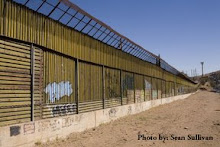In 2005 the Real ID Act was attached as a rider on an appropriations bill funding the wars in Iraq and Afghanistan after it failed to pass on its own merits. It contained a provision intended to overrule the objections of the California Coastal Commission and anyone else who might oppose the construction of border barriers. “Notwithstanding any other provision of law, the Secretary of Homeland Security shall have the authority to waive all legal requirements such Secretary, in such Secretary’s sole discretion, determines necessary to ensure expeditious construction of the barriers and roads under this section.” Secretary of Homeland Security Michael Chertoff used his unprecedented new power to “waive in their entirety” the Endangered Species Act, the Migratory Bird Treaty Act, the National Environmental Policy Act, the Coastal Zone Management Act, the Clean Water Act, the Clean Air Act, and the National Historic Preservation Act, and a host of other federal laws to override court challenges to the construction of walls in California and Arizona. There is of course no reason for DHS to waive a law unless they know that their actions will violate it.
Defenders of Wildlife and the Sierra Club are challenging the authority to waive all of our nation's laws before the Supreme Court. They have issued the following press release:
WASHINGTON – Today, Defenders of Wildlife and The Sierra Club filed a petition asking the U.S. Supreme Court to hear its argument that the REAL ID Act, which grants Department of Homeland Security (DHS) Secretary Michael Chertoff unprecedented and sweeping authority to waive any and all laws to expedite the construction of a wall along the U.S.-Mexico border, is unconstitutional besides being harmful to the environment and border communities. The two conservation groups charge that such unbounded authority to the executive branch is a violation of the Constitution’s separation of powers provisions.
“By granting one government official the absolute power to pick and choose which laws apply to border wall construction, the REAL ID Act proves itself to be both inherently dangerous and profoundly un-American. The issue here is not security vs. wildlife, but whether wildlife, sensitive environmental values and communities along the border will be given fair consideration in the decisions the government makes,” said Rodger Schlickeisen, president of Defenders of Wildlife. “We are hopeful that the Supreme Court will take up this case in order to protect the fundamental separation of powers principles enshrined in the United States Constitution”
“Laws such as the National Environmental Policy Act and the National Historic Preservation Act are part of America's enduring legal framework, and no agency or public official should be allowed to ignore them,” said Carl Pope, executive director of Sierra Club. “Our laws have provided Americans a voice in the decision-making process that affects their lives, their human rights and the protection of wildlife; our government must not exempt itself from obeying those laws.”
The groups’ petition is the latest chapter in their legal efforts dating back to October, 2007 to safeguard the borderlands in the face of aggressive border wall construction. At that time, Defenders and The Sierra Club filed a lawsuit challenging DHS and Bureau of Land Management’s (BLM) approval of border wall construction within the San Pedro Riparian National Conservation Area in Arizona. After a federal judge in the U.S. District Court for District of Columbia found that the groups would likely prevail on their claims and issued an injunction blocking further construction of the wall, Secretary Chertoff waived 19 laws intended to protect public health, wildlife and endangered species, clean air and water, and historic and archeological sites to move forward with construction.
In their petition to the U.S. Supreme Court, Defenders and The Sierra Club contend that the REAL ID Act’s waiver provision unconstitutionally allows the DHS secretary unilaterally to repeal laws, threatening the system of checks and balances assured in the Constitution.
Since passage of the REAL ID Act in 2005, Secretary Chertoff has used this power to waive laws on three occasions:
to complete a wall near San Diego, California
to remove vehicle barriers and replace them with a wall in the Barry M. Goldwater Range in Arizona
to build a border wall within the San Pedro Riparian National Conservation Area.
In addition, Secretary Chertoff appears poised to again waive laws in relation to proposed border wall construction in Texas, in order to bypass extensive opposition from local residents, elected leaders, business owners, and conservationists.
“It isn’t too much to ask that DHS and other government agencies comply with our nation’s environmental laws along the border, particularly where international treasures like the San Pedro River are at stake,” said Schlickeisen. “We can not afford to let this keep happening all across the border or we will be left with nothing but a 700-mile testament to our own short-sightedness.”
Defenders and Sierra Club are represented by the Yale Law School Supreme Court Clinic, led by Professor Dan Kahan. Defenders is also represented by Andrew J. Pincus and Charles Rothfeld of Mayer Brown, LLP.
Subscribe to:
Post Comments (Atom)



1 comment:
There's one more aspect to The Real ID Act that you don't hear much about. What if someone could read and write to them? And this someone was a bad guy?
It's true. They're using the same chips the financial institutions are to "protect" our data, and the hackers have already broken-and are BROADCASTING-this information around the web.
Google (use the quotes) "RFID Hacking" and see how many there are.
Watch this video to see how easy it is:http://www.youtube.com/watch?v=K4VZUDzRw9E
We've got more resources at our site www.ArmadilloDollar.com if you want to take a look.
I am Ron Hatton, inventor, Co-founder and developer of The Armadillo Dollar.
TopDog.
Post a Comment